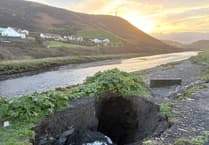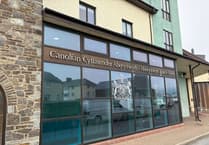Archbishop Andrew John says the world faces a climate emergency and we all need to reform to limit global warming.
The Archbishop of Wales, who comes from Aberystwyth, Ceredigion and is also the Bishop of Bangor, made this statement in a key note address today, Wednesday, 19 April.
The latest IPCC (Intergovernmental Panel on Climate Change) report, published in March, made for a “sobering read” said Archbishop Andrew John.
He warned churches not to fall into the trap of thinking there was little they could do, calling on them instead to be “prophetically active” – in their personal choices, their ministry and their advocacy at governments to call for change.
“The reality is that we face what is now understood to be no longer a climate challenge, but an emergency and that every part of human activity will need reform if we are to reduce emissions and limit global warming. So much hangs on this,” he said.
Delivering his Presidential Address to members of the Church in Wales’ Governing Body at the start of its two-day meeting in Llandudno, the Archbishop announced that the Church would hold an Environmental Summit next year to bring together key stakeholders with the aim of making Wales “an exemplar of good practice”.
“It is my hope that politicians, those in the agricultural world, those who monitor our rivers and soils, academics and environmentalists will be present to begin a different kind of conversation - less about blaming and more about finding the points at which co-operation can happen. We are all in this together and the solutions will require co-ordination and courteous, intelligent and unguarded work,” he said.
Archbishop Andrew called on people to make an on-going commitment to “reuse, reduce and recycle” in their personal lives.
“Although these changes can seem small, their main effect is on the way markets work. We are able to shape the priorities of multinational groups in goods and services by making personal choices.”
He also urged all churches to sign up for the A Rocha Eco Church scheme and make churchyards places where biodiversity could flourish.
Nationally, the Church was launching an Energy Footprint Tool and setting up a Climate Hub to support churches and monitor progress towards its goal of net zero carbon by 2030.
The Archbishop also addressed church growth, following the announcement last year of £100m investment from historic reserves. Church communities across all traditions were growing where there was excellent leadership, vibrant faith and clarity around purpose. He described growth at St Thomas’ Church in Swansea as an example.
“When surrounded by an outwardly focused ministry, there are few organizations who can compare with us and the growth we are seeing,” he said.
Turning to accountability and risk assessment, Archbishop Andrew said significant developments had been made over the past three years, including the setting up of an Independent Safeguarding Panel to ensure “we don’t fall into the trap of marking our own homework”.
“Credibility and authenticity is at the heart of our church life. We aim to do and to be exactly what it says on the tin,” he said.
He endorsed the Dignity at Work Charter, saying the Church was looking at engaging more thoroughly with it. He encouraged every Ministry Area Council to make it part of their annual routine.
The recent Periodic External Review of St Padarn’s Institute was praised as a “strong endorsement of the quality and direction of training undertaken”. Work, however, was needed to develop the breadth of ministries and blend them “within a generous understanding of what it means to be Anglican”.
Meanwhile, a 24-hour ‘gathering’ of leaders from across the Province later this year would be “strategically significant” said Archbishop Andrew.
“The art of the synod is to learn to walk together and this needs to become normative if we are to see our life as a Church in Wales flourish.”
The Archbishop concluded his address with a call to trust in God, even when the world faced such pressing issues.
“It is the Lord who knows each of us by name, who loves us unconditionally, who asks us to make the decision not to let our hearts be troubled and to respond to his call with faith and confidence.”





Comments
This article has no comments yet. Be the first to leave a comment.